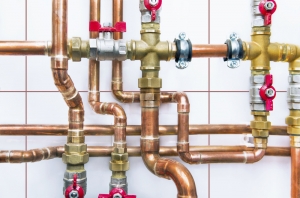 Your home’s plumbing is susceptible to failure due to old age, lack of maintenance, faulty components, low-quality installations, and even fluctuations in temperatures. Avoid major property damage and the headaches that come along with repairing your home’s plumbing by understanding your plumbings life cycle and when it’s time to replace it.
Your home’s plumbing is susceptible to failure due to old age, lack of maintenance, faulty components, low-quality installations, and even fluctuations in temperatures. Avoid major property damage and the headaches that come along with repairing your home’s plumbing by understanding your plumbings life cycle and when it’s time to replace it.
Pipe Material
The lifespan of your plumbing will greatly differ on the material of your pipes. When you purchased or built your home and had an inspector inspect your home, they should have provided you with an appraisal or inspection report, which will include the material of your pipes.
Generally speaking, each pipe material has the following lifespans:
- Copper: 50+ years
- Brass: 40-45 years
- Cast Iron: 75-100 years
- Galvanized Steel: 20-50 years
- PVC: Indefinitely
While most of these materials have lifespans that shouldn’t require replacement during your lifetime, you do also have to consider the joints, fittings, and mechanical components of your pipes. These can all deteriorate over time, requiring repair and replacement.
Signs of Failing Plumbing
Not sure if your plumbing is failing? Most signs are obvious but with hectic days at work, making dinner for your family, and running errands, sometimes you don’t think twice about them. If you’ve noticed any of the following, it’s time to schedule an appointment with your plumber!
- Pipe cracks, corrosion, or leaks from the piping
- Wet baseboards
- Wetness behind your dishwasher or sinks
- Water-stained or warped flooring, walls, or ceilings
- Rust-colored water tubing
- Low water pressure
- Gurgling or rattling sounds from your piping
- Dampness or mold in crawl spaces
- Slow-moving drains
Repair or Replace?
If you are experiencing slow-moving drains, gurgling or rattling sound from your piping, or low water pressure, this is a sign that your pipes are clogged or have air trapped in them, which should be repaired as soon as possible to avoid any major problems.
When it comes to replacing the piping in your home, a good rule of them is to replace it whenever you renovate a kitchen, bathroom, or basement. By replacing only the exposed piping, you’ll be able to save a little extra money, especially if there is no sign of leaking water. If you’re removing or replacing walls, it’s best to handle that project will you’re in demo mode!